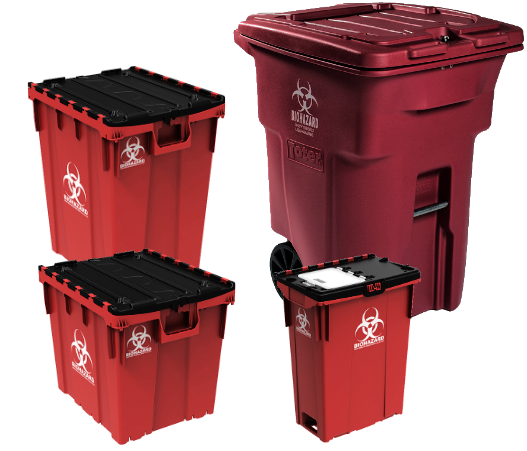Stay Ahead of Laws: Specialist Suggestions on Medical Waste Disposal
In a globe where the health care industry is constantly advancing, it is essential for clinical centers to stay ahead of laws when it comes to the correct disposal of medical waste. From understanding the various classifications of medical waste to applying the ideal collection and segregation approaches, this conversation will give useful insights and workable suggestions to assist centers stay in advance of guidelines in the ever-changing landscape of medical waste disposal.
Comprehending Medical Waste Categories
Comprehending medical waste classifications is important for correct disposal and administration in medical care facilities. Clinical waste refers to any kind of waste generated by medical care activities that might position a hazard to public health and wellness or the setting. It is vital to categorize clinical waste properly to ensure its risk-free handling, disposal, treatment, and transport.
There are numerous categories of medical waste that medical care facilities need to be accustomed to. One of the most common classifications consist of transmittable waste, pathological waste, sharps waste, pharmaceutical waste, and chemical waste. Each category has certain standards and policies for its appropriate monitoring and disposal.
Pathological waste refers to human tissues, body organs, or body components that call for unique handling and disposal. Drug waste makes up ended, unused, or contaminated drugs that require cautious handling and disposal.
Staying Up-To-Date With Regulatory Changes
Remaining present with governing modifications is vital for medical care centers to make sure compliance and proper management of medical garbage disposal. medical waste removal near me. With laws regularly developing, it is vital for healthcare centers to remain up-to-date to avoid fines, fines, and potential injury to the atmosphere and public health and wellness
To stay in advance of regulative changes, medical care facilities should develop a system for monitoring and monitoring updates. This can be done by signing up for regulatory e-newsletters, going to workshops and meetings, and actively getting involved in market organizations. Furthermore, facilities must designate a team member or group in charge of remaining informed and sharing info to pertinent stakeholders.
Routine interaction with regulatory firms is also crucial. Healthcare centers should establish partnerships with local, state, and government firms to ensure they know any modifications in regulations that may influence their waste management methods. This can be done via regular meetings, engagement in public comment periods, and positive involvement with regulatory companies.
Moreover, healthcare facilities must consider partnering with waste monitoring business that specialize in clinical waste disposal (medical waste disposal services with WasteX). These companies are typically fluent in the newest guidelines and can give guidance and support to guarantee conformity
Applying Correct Collection and Partition Methods
To efficiently handle medical garbage disposal, medical care centers have to develop correct collection and segregation techniques according to regulative guidelines. Executing these techniques makes sure the risk-free handling and disposal of potentially dangerous materials, safeguards the environment, and minimizes the risk of infections and injuries to healthcare workers and the basic public.
Correct collection and partition techniques include using designated containers and labeling systems. Medical care centers must offer plainly classified containers for different types of medical waste, such as sharps, transmittable waste, pharmaceutical waste, and non-hazardous waste. These containers need to be color-coded and plainly marked to avoid complication and advertise easy identification.
In addition, health care facilities should educate their personnel on the correct treatments for gathering and segregating clinical waste. This consists of educating them on the various kinds of waste, the appropriate containers to make use of, and the value of following standards and guidelines. Routine training sessions and correspondence course ought to be performed to make sure that staff participants remain current on best methods.
Moreover, healthcare centers ought to develop a system for regular collection and disposal of clinical waste. This may entail partnering with certified waste monitoring business that concentrate on medical garbage disposal. These companies will certainly ensure that the gathered waste is transferred and disposed of in compliance with governing requirements.
Picking the Right Disposal Methods

Incineration is just one of the most typical and efficient approaches for dealing with specific types of medical waste, such as pathological waste and sharps. It includes the controlled combustion of waste at heats, minimizing it to ash. Incineration can launch dangerous toxins right into the air and contribute to air pollution.

Chemical therapy entails the usage of chemicals to decontaminate and neutralize the waste. Microwave treatment utilizes microwave energy to warm and sanitize the waste.
Making Sure Conformity Via Documents and Training
After meticulously considering the appropriate disposal methods for medical waste, health care facilities should guarantee compliance with policies and reduce environmental impact by implementing effective documentation and training treatments. This action is important in maintaining a secure and lasting atmosphere for both health care workers and the general public.

Medical care employees that handle medical waste should receive suitable training on waste segregation, managing, and disposal procedures. By supplying detailed training, health care centers can equip their personnel to make educated over at this website decisions and reduce the risk of improper waste disposal.
Conclusion
In conclusion, remaining in advance of guidelines in clinical waste disposal is important for health care facilities. medical waste removal services. Comprehending the different categories of clinical waste, remaining updated with regulatory adjustments, applying appropriate collection and segregation methods, picking the proper disposal techniques, and ensuring conformity with documentation and training are all essential actions. By complying with these guidelines, medical care organizations can effectively take care of and get rid of of medical waste in a secure and accountable way
From understanding the various classifications of clinical waste to carrying out the appropriate collection and partition methods, this conversation will supply important understandings and actionable pointers to assist centers stay in advance of regulations in the ever-changing landscape of clinical waste disposal. - medical waste disposal services with WasteX
The most common classifications consist of transmittable waste, pathological waste, sharps waste, pharmaceutical waste, and chemical waste. Medical care centers should offer clearly identified containers for various kinds of clinical waste, such as sharps, transmittable waste, pharmaceutical waste, and non-hazardous waste. Medical care centers should establish an extensive system to tape-record and track all elements of medical waste disposal, including types of waste produced, quantities, and disposal techniques utilized. Health basics care workers who deal with medical waste ought to receive suitable training on waste segregation, handling, and disposal procedures.